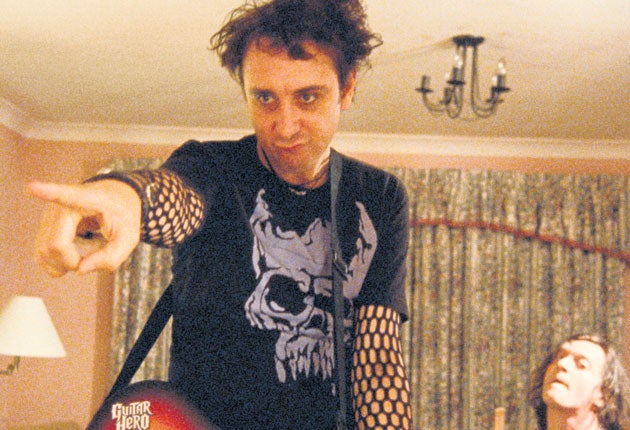Claire Beale On Advertising: How planning assured a supersoldier's success

Your support helps us to tell the story
From reproductive rights to climate change to Big Tech, The Independent is on the ground when the story is developing. Whether it's investigating the financials of Elon Musk's pro-Trump PAC or producing our latest documentary, 'The A Word', which shines a light on the American women fighting for reproductive rights, we know how important it is to parse out the facts from the messaging.
At such a critical moment in US history, we need reporters on the ground. Your donation allows us to keep sending journalists to speak to both sides of the story.
The Independent is trusted by Americans across the entire political spectrum. And unlike many other quality news outlets, we choose not to lock Americans out of our reporting and analysis with paywalls. We believe quality journalism should be available to everyone, paid for by those who can afford it.
Your support makes all the difference.Ask people who don't work in the business what advertising is and they'll probably tell you (when they've stopped being rude), that it's words and pictures that try to sell them things in magazines and newspapers, and on TV. But behind those words and pictures is a whole industry of insight and understanding that makes the ads themselves effective.
It's called planning and, crudely put, it's about using knowledge and understanding to make sure all those advertising words and pictures we see make us think and feel the things that will help solve businesses' problems.
Last week the advertising industry's best planning brains came together to celebrate their craft at the Account Planning Group Awards and the big gong on the night went to the planning behind the launch of the Xbox game Halo 3.
The campaign was created by McCann Erickson and had some really tough targets to meet. Halo is one of those gaming franchises that has built a hardcore following over the years: the Halo Nation. But when Microsoft was preparing to launch the third installment in the series, it wasn't looking only to slake the thirst of its hardcore fans, all 1.1 million of them. Microsoft was gunning for sales of 1.5 million copies of Halo 3 in its first year on the market.
Halo 3 was launching into a competitive market and had firm ambitions to sell beyond core gamers. To cut through and broaden its appeal, the new game had to play in the wider entertainment space and generate as much noise and excitement as, say, the latest Spider-Man movie.
Now, I reckon this next bit is either thoroughly masochistic, ridiculously cocky or the result of cunning hindsight, but the team behind the launch upped the challenge and set themselves the objective of making Halo 3 the biggest entertainment opening day of all time. They wanted to beat the record of £76.5m in opening revenues that had been achieved by Spider-Man 3.
To achieve this, the planners at McCann Erickson needed to get under the skin of why Halo fans were so passionate about the game and then explore whether this passion could be spread to a wider audience.
Which is where Master Chief comes in. Not a BBC cook-off, but a "towering and faceless cybernetically enhanced supersoldier" (says Wikipedia) and the star of Halo. The McCann Erickson planners realised that what Halo was really about was a hero, Master Chief. It was this new focus on celebrating the Halo hero (rather than the game's special effects) that was key, opening up universal themes of bravery, sacrifice, duty and selfishness that had appeal well beyond the gaming nerds. We all like a hero. Looked at this way, Halo 3 went from being a high-tech shoot-em-up to an epic saga that tapped into the best traditions of story-telling and the timeless emotiveness of heroism. And the agency had built the foundations for its creative approach.
A virtual Museum of Humanity was created dedicated to the memory of Master Chief. Experiential activity (real statues and wall plaques honouring Master Chief and commemorating fictional battle sites were placed on the streets of cities round Europe), TV ads (featuring war veterans paying homage to Master Chief), online content and awareness-driving PR all enhanced the idea of the archetypal hero and added a rich depth to the otherwise enclosed world of the game itself.
You begin to see how the planning insight meant that the creative work was better, more engaging, more relevant and had a wider cultural significance. And it worked. Halo 3 notched up £84m in sales in its first 24 hours on the market, easily beating the old Spider-Man 3 record.
Often an unsung and unglamourised function in the advertising process, brilliant planning can create an environment for brilliant advertising. As last week's planning awards proved, great planning is where the best advertising starts.
Best in Show: Doritos' Guitar Hero (AMV BBDO)
If I had to try to guess at the planning insight behind Abbott Mead Vickers BBDO's new work advertising Doritos' new Guitar Hero Xbox promotion, I'd say it had something to do with the fact that far too many men wish they were Eric Clapton. I might be wrong. Anyway, the result is a gently engaging film starring Alan, who's been acting out his rocker fantasies from the moment he was born. We follow Alan's (pathetic) life as a wannabe guitar hero in a four-minute film and it's a nice example of advertising that earns your attention by being genuinely entertaining.
Join our commenting forum
Join thought-provoking conversations, follow other Independent readers and see their replies
Comments